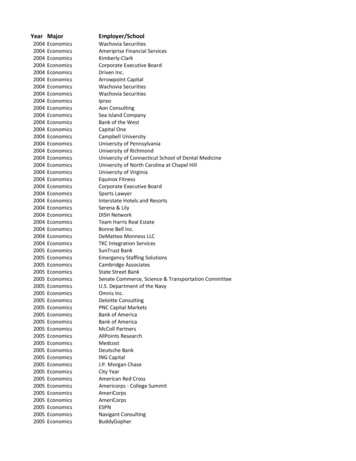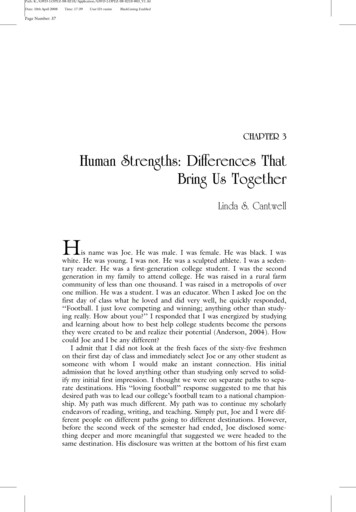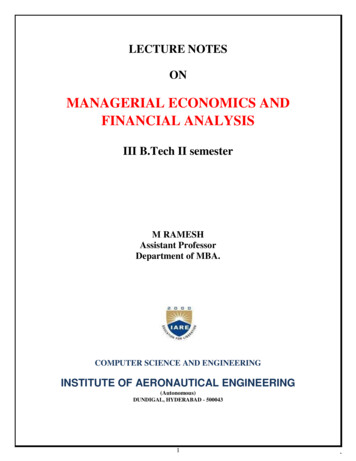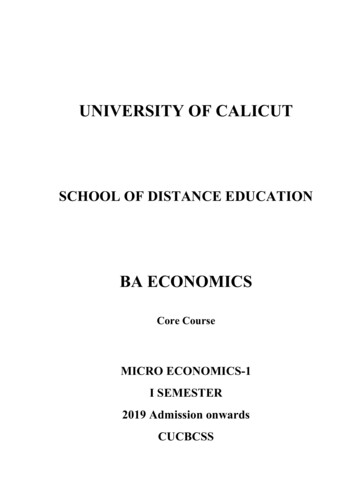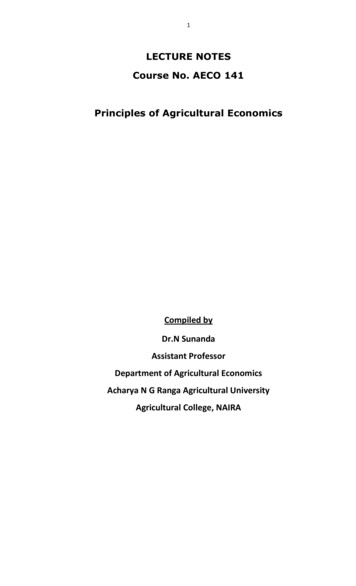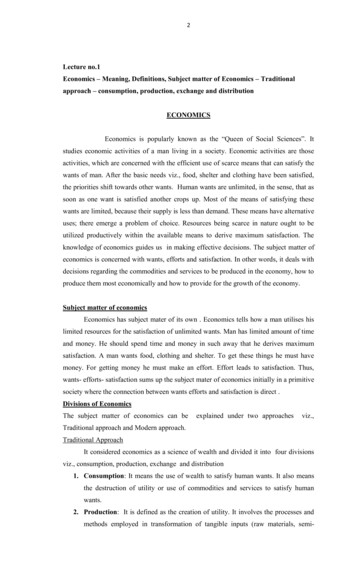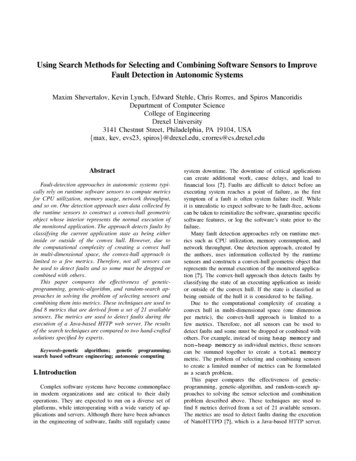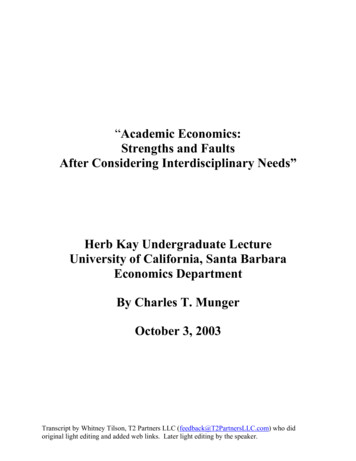
Transcription
“Academic Economics:Strengths and FaultsAfter Considering Interdisciplinary Needs”Herb Kay Undergraduate LectureUniversity of California, Santa BarbaraEconomics DepartmentBy Charles T. MungerOctober 3, 2003Transcript by Whitney Tilson, T2 Partners LLC (feedback@T2PartnersLLC.com) who didoriginal light editing and added web links. Later light editing by the speaker.
TABLE OF CONTENTSPageIntroduction by Rajnish Mehra . 1Munger’s Opening Remarks:. 1Non-use of Efficient Market Theory at Berkshire . 2Personal Multidisciplinary Education. 3The Obvious Strengths of Academic Economics . 4What’s Wrong with Economics . 51)Fatal Unconnectedness, Leading To “Man With A HammerSyndrome,” Often Causing Overweighing What Can Be Counted . 52)Failure To Follow The Fundamental Full Attribution Ethos of HardScience . 63)Physics Envy. 7Washington Post case study. 7Einstein and Sharon Stone . 74)Too Much Emphasis on Macroeconomics. 8Case study: Nebraska Furniture Mart’s new store in Kansas City . 8Case study: Les Schwab Tires . 9Causes of problem-solving success . 95)Too Little Synthesis in Economics . 106)Extreme and Counterproductive Psychological Ignorance. 137)Too Little Attention to Second and Higher Order Effects. 14Mispredicting Medicare costs . 14Investing in textile looms. 14Workman’s comp madness . 15Niederhoffering the curriculum . 158)Not Enough Attention to the Concept of Febezzlement . 179)Not Enough Attention to Virtue and Vice Effects . 18Religion. 18Pay for directors and judges. 18Not a vice that some systems are deliberately made unfair . 19-i-
TABLE OF CONTENTS(continued)PageContributions of vice to bubbles . 19Paradoxical good contributions from vice; the irremovability ofparadox. 19Conclusion . 20Clinging to failed ideas – a horror story . 20Repeating the big lesson . 21Q & A . 21-ii-
Introduction by Rajnish MehraMusic. Good afternoon. I am Rajnish Mehra, chair of the Economics Department[www.econ.ucsb.edu/ mehra/], and on behalf of the entire department it is my pleasure towelcome you to our annual Herb Kay Undergraduate Lecture, underwritten by the generosity ofHerb Kay. Herb was on our faculty in the ‘60s and has remained a friend and benefactor of theDepartment. We are very fortunate to have Herb here in the audience today. So please join mein giving him a very warm welcome. (Applause).Mr. Munger’s achievements are very great. They are too numerous for me to detail here. Heattended Caltech and Harvard, and in addition to being Vice Chair at Berkshire Hathaway, he’sthe chair of a major legal newspaper corporation and also Wesco Financial Corporation. He’sthe President of the Alfred C. Munger Foundation, a philanthropic foundation named after hisfather. He’s on the Forbes 400 list – and what makes that achievement remarkable is that he gotthere the old fashioned way: He earned it. (Laughter).He’s – after Warren Buffett – the largest shareholder in Berkshire Hathaway. And as you cansee he’s a fan of Coke, both of the stock and the drink. (Laughter).It’s a personal privilege to introduce Mr. Munger to the UCSB community. I have long been afan of his Mungerisms. And to quote a particular favorite one that has served me in good stead:Never wrestle with a pig, for if you do, you will both get dirty, but the pig will enjoy it.(Laughter).Ladies and gentlemen, please join me in welcoming Charles Munger. He will speak to us todayon Interdisciplinary Wisdom Involving Economics.Munger’s Opening Remarks:I’ve outlined some remarks in a rough way, and after I’m finished talking from that outline, I’lltake questions as long as anybody can endure listening, until they drag me away to wherever elseI’m supposed to go.As you might guess, I agreed to do this because the subject of getting the soft sciences so theytalked better to each other has been one that has interested me for decades. And, of course,economics is in many respects the queen of the soft sciences. It’s expected to be better than therest. It’s my view that economics is better at the multi-disciplinary stuff than the rest of the softscience. And it’s also my view that it’s still lousy, and I’d like to discuss this failure in this talk.As I talk about strengths and weaknesses in academic economics, one interesting fact you areentitled to know is that I never took a course in economics. And with this striking lack ofcredentials, you may wonder why I have the chutzpah to be up here giving this talk. The answeris I have a black belt in chutzpah. I was born with it. Some people, like some of the women Iknow, have a black belt in spending. They were born with that. But what they gave me was ablack belt in chutzpah.But I come from two peculiar strands of experience that may have given me some usefuleconomic insights. One is Berkshire Hathaway and the other is my personal educational history.-1-
Berkshire, of course, has finally gotten interesting. When Warren took over Berkshire, themarket capitalization was about ten million dollars. And forty something years later, there arenot many more shares outstanding now than there were then, and the market capitalization isabout a hundred billion dollars, ten thousand for one. And since that has happened, year afteryear, in kind of a grind-ahead fashion, with very few failures, it eventually drew some attention,indicating that maybe Warren and I knew something useful in microeconomics.Non-use of Efficient Market Theory at BerkshireFor a long time there was a Nobel Prize-winning economist who explained BerkshireHathaway’s success as follows:First, he said Berkshire beat the market in common stock investing through one sigma of luck,because nobody could beat the market except by luck. This hard-form version of efficientmarket theory was taught in most schools of economics at the time. People were taught thatnobody could beat the market. Next the professor went to two sigmas, and three sigmas, andfour sigmas, and when he finally got to six sigmas of luck, people were laughing so hard hestopped doing it.Then he reversed the explanation 180 degrees. He said, “No, it was still six sigmas, but is wassix sigmas of skill.” Well this very sad history demonstrates the truth of Benjamin Franklin’sobservation in Poor Richard’s Almanac. If you would persuade, appeal to interest and not toreason. The man changed his view when his incentives made him change it, and not before.I watched the same thing happen at the Jules Stein Eye Institute at UCLA. I asked at one point,why are you treating cataracts only with a totally obsolete cataract operation? And the man saidto me, “Charlie, it’s such a wonderful operation to teach.” (Laughter). When he stopped usingthat operation, it was because almost all the patients had voted with their feet. Again, appeal tointerest and not to reason if you want to change conclusions.Well, Berkshire’s whole record has been achieved without paying one ounce of attention to theefficient market theory in its hard form. And not one ounce of attention to the descendants ofthat idea, which came out of academic economics and went into corporate finance and morphedinto such obscenities as the capital asset pricing model, which we also paid no attention to. Ithink you’d have to believe in the tooth fairy to believe that you could easily outperform themarket by seven-percentage points per annum just by investing in high volatility stocks.Yet, believe it or not, like the Jules Stein doctor, people once believed this stuff. And the beliefwas rewarded. And it spread. And many people still believe it. But Berkshire never paid anyattention to it. And now I think the world is coming our way and the idea of perfection in allmarket outcomes is going the way of the DoDo.It was always clear to me that the stock market couldn’t be perfectly efficient, because as ateenager, I’d been to the racetrack in Omaha where they had the parimutuel system. And it wasquite obvious to me that if the house takes the croupier’s take, was 17%, some peopleconsistently lost a lot less then 17% of all their bets, and other people consistently lost more than17% of all their bets. So the parimutuel system in Omaha had no perfect efficiency. And so I-2-
didn’t accept the argument that the stock market was always perfectly efficient in creatingrational prices.Indeed, there’s been some documented cases since, of people getting so good at understandinghorses and odds, that they actually are able to beat the house in off-track betting. There aren’tmany people who can do that, but there are a few people in America who can.Personal Multidisciplinary EducationNext, my personal education history is interesting because its deficiencies and my peculiaritieseventually created advantages. For some odd reason, I had an early and extrememultidisciplinary cast of mind. I couldn’t stand reaching for a small idea in my own disciplinewhen there was a big idea right over the fence in somebody else’s discipline. So I just grabbedin all directions for the big ideas that would really work. Nobody taught me to do that; I was justborn with that yen. I also was born with a huge craving for synthesis. And when it didn’t comeeasily, which was often, I would rag the problem, and then when I failed I would put it aside andI’d come back to it and rag it again. It took me 20 years to figure out how and why the ReverendMoon’s conversion methods worked. But the psychology departments haven’t figured it out yet,so I’m ahead of them.But anyway, I have this tendency to want to rag the problems. Because WW II caught me. Idrifted into some physics, and the Air Corps sent me to Caltech where I did a little more physicsas part of being made into a meteorologist. And there, at a very young age, I absorbed what Icall the fundamental full attribution ethos of hard science. And that was enormously useful tome. Let me explain that ethos.Under this ethos, you’ve got to know all the big ideas in all the disciplines less fundamental thanyour own. You can never make any explanation, which can be made in a more fundamentalway, in any other way than the most fundamental way. And you always take with full attributionto the most fundamental ideas that you are required to use. When you’re using physics, you sayyou’re using physics. When you’re using biology, you say you’re using biology. And so on andso on. I could early see that that ethos would act as a fine organizing system for my thought.And I strongly suspected that it would work really well in the soft sciences as well as the hardsciences, so I just grabbed it and used it all through my life in soft science as well as hardscience. That was a very lucky idea for me.Let me explain how extreme that ethos is in hard science. There is a constant, one of thefundamental constants in physics, known as Boltzmann’s constant. You probably all know itvery well. And the interesting thing about Boltzmann’s constant is that Boltzmann didn’tdiscover it. So why is Boltzmann’s constant now named for Boltzmann? Well, the answer wasthat Boltzmann derived that constant from basic physics in a more fundamental way than thepoor forgotten fellow who found the constant in the first place in some less fundamental way.The ethos of hard science is so strong in favor of reductionism to the more fundamental body ofknowledge that you can wash the discoverer right out of history when somebody else handles hisdiscovery in a more fundamental way. I think that is correct. I think Boltzmann’s constantshould be named for Boltzmann.-3-
At any rate, in my history and Berkshire’s history Berkshire went on and on into considerableeconomic success, while ignoring the hard form efficient markets doctrine once very popular inacademic economics and ignoring the descendants of that doctrine in corporate finance, wherethe results became even sillier than they were in the economics. This naturally encouraged me.Finally, with my peculiar history, I’m also bold enough to be here today, because at least when Iwas young I wasn’t a total klutz. For one year at the Harvard Law School, I was ranked secondin my group of about a thousand, and I always figured that, while there were always a lot ofpeople much smarter than I was, I didn’t have to hang back totally in the thinking game.The Obvious Strengths of Academic EconomicsLet me begin by discussing the obvious strengths of academic economics. The first obviousstrength, and this is true of lot of places that get repute, is that it was in the right place at the righttime. Two hundred years ago, aided by the growth of technology and the growth of otherdevelopments in the civilization, the real output per capita of the civilized world started going upat about 2% per annum, compounded. And before that, for the previous thousands of years, ithad gone up at a rate that hovered just a hair’s breadth above zero. And, of course, economicsgrew up amid this huge success. Partly it helped the success, and partly it explained it. So,naturally, academic economics grew. And lately with the collapse of all the communisteconomies, as the free market economies or partially free market economies flourished, thatadded to the reputation of economics. Economics has been a very favorable place to be if you’rein academia.Economics was always more multidisciplinary than the rest of soft science. It just reached outand grabbed things as it needed to. And that tendency to just grab whatever you need from therest of knowledge if you’re an economist has reached a fairly high point in kiw/mankiw.html] new textbook [Principles ofEconomics, apitalpar]. I checked outthat textbook. I must have been one of the few businessmen in America that bought itimmediately when it came out because it had gotten such a big advance. I wanted to figure outwhat the guy was doing where he could get an advance that great. So this is how I happened toriffle through Mankiw’s freshman textbook. And there I found laid out as principles ofeconomics: opportunity cost is a superpower, to be used by all people who have any hope ofgetting the right answer. Also, incentives are superpowers.And lastly, the tragedy of the commons model, popularized by UCSB’s Garrett Hardin[www.es.ucsb.edu/faculty/hardin.php; died 9/03]. Hardin caused the delightful introduction intoeconomics – alongside Smith’s beneficent invisible hand – of Hardin’s wicked evildoinginvisible foot. Well, I thought that the Hardin model made economics more complete, and Iknew when Hardin introduced me to his model, the Tragedy of the Commons[www.garretthardinsociety.org/articles/art tragedy of the commons.html], that it would be inthe economics textbooks eventually. And, low and behold, it finally made it about 20 years later.And it’s right for Mankiw to reach out into other disciplines and grab Hardin’s model andanything else that works well.-4-
Another thing that helped economics is that from the beginning it attracted the best brains in softscience. Its denizens also interacted more with the practical world than was at all common insoft science and the rest of academia, and that resulted in very creditable outcomes like the threecabinet appointments of economics PhD George Schultz and the cabinet appointment of LarrySummers. So this has been a very favored part of academia.Also, economics early on attracted some of the best writers of language in the history of theearth. You start out with Adam Smith. Adam Smith was so good a thinker, and so good awriter, that in his own time, Emmanuel Kant, then the greatest intellectual in Germany, simplyannounced that there was nobody in Germany to equal Adam Smith. Well Voltaire, being aneven more pithy speaker than Kant, which wouldn’t be that hard, immediately said, “Oh well,France doesn’t have anybody who can even be compared to Adam Smith.” So economics startedwith some very great men and great writers.And then there have been later great writers like John Maynard Keynes, whom I quote all thetime, and who has added a great amount of illumination to my life. And finally, even in thepresent era, if you take Paul ped/oped/columnists/paulkrugman/index.html]and read his essays, you will be impressed by his fluency. I can’t stand his politics; I’m on theother side. But I love this man’s essays. I think Paul Krugman is one of the best essayists alive.And so economics has constantly attracted these fabulous writers. And they are so good thatthey have this enormous influence far outside their economic discipline, and that’s veryuncommon in other academic departments.Okay, now it’s time to extend criticism, instead of praise. We’ve recognized that economics isbetter than other soft-science academic departments in many ways. And one of the glories ofcivilization. Now it’s only fair that we outline a few things that are wrong with academiceconomics.What’s Wrong with Economics1)Fatal Unconnectedness, Leading To “Man With A Hammer Syndrome,” OftenCausing Overweighing What Can Be CountedI think I’ve got eight, no nine objections, some being logical subdivisions of a big generalobjection. The big general objection to economics was the one early described by Alfred NorthWhitehead when he spoke of the fatal unconnectedness of academic disciplines, wherein eachprofessor didn’t even know the models of the other disciplines, much less try to synthesize thosedisciplines with his own.I think there’s a modern name for this approach that Whitehead didn’t like, and that name isbonkers. This is a perfectly crazy way to behave. Yet economics, like much else in academia, istoo insular.The nature of this failure is that it creates what I always call, “man with a hammer syndrome.”And that’s taken from the folk saying: To the man with only a hammer, every problem lookspretty much like a nail. And that works marvelously to gum up all professions, and alldepartments of academia, and indeed most practical life. The only antidote for being an absolute-5-
klutz due to the presence of a man with a hammer syndrome is to have a full kit of tools. Youdon’t have just a hammer. You’ve got all the tools. And you’ve got to have one more trick.You’ve got to use those tools checklist-style, because you’ll miss a lot if you just hope that theright tool is going to pop up unaided whenever you need it. But if you’ve got a full list of tools,and go through them in your mind, checklist-style, you will find a lot of answers that you won’tfind any other way. So limiting this big general objection that so disturbed Alfred NorthWhitehead is very important, and there are mental tricks that help do the job.Overweighing what can be countedA special version of this “man with a hammer syndrome” is terrible, not only in economics butpractically everywhere else, including business. It’s really terrible in business. You’ve got acomplex system and it spews out a lot of wonderful numbers that enable you to measure somefactors. But there are other factors that are terribly important, [yet] there’s no precise numberingyou can put to these factors. You know they’re important, but you don’t have the numbers.Well practically everybody (1) overweighs the stuff that can be numbered, because it yields tothe statistical techniques they’re taught in academia, and (2) doesn’t mix in the hard-to-measurestuff that may be more important. That is a mistake I’ve tried all my life to avoid, and I have noregrets for having done that.The late, great, Thomas Hunt Morgan [www.nobel.se/medicine/articles/lewis/], who was one ofgreatest biologists who ever lived, when he got to Caltech, had a very interesting, extreme wayof avoiding some mistakes from overcounting what could be measured, and undercounting whatcouldn’t. At that time there were no computers and the computer substitute then available toscience and engineering was the Frieden calculator, and Caltech was full of Frieden calculators.And Thomas Hunt Morgan banned the Frieden calculator from the biology department. Andwhen they said, “What the hell are you doing, Mr. Morgan?,” He said, “Well, I am like a guywho is prospecting for gold along the banks of the Sacramento River in 1849. With a littleintelligence, I can reach down and pick up big nuggets of gold. And as long as I can do that, I’mnot going to let any people in my department waste scarce resources in placer mining.” Andthat’s the way Thomas Hunt Morgan got through life.I’ve adopted the same technique, and here I am in my 80th year. I haven’t had to do any placermining yet. And it begins to look like I’m going to get all the way through, as I’d always hoped,without doing any of that damned placer mining. Of course if I were a physician, particularly anacademic physician, I’d have to do the statistics, do the placer mining. But it’s amazing whatyou can do in life without the placer mining if you’ve got a few good mental tricks and just keepragging the problems the way Thomas Hunt Morgan did.2)Failure To Follow The Fundamental Full Attribution Ethos of Hard ScienceWhat’s wrong with the way Mankiw does economics is that he grabs from other disciplineswithout attribution. He doesn’t label the grabbed items as physics or biology or psychology, orgame theory, or whatever they really are, fully attributing the concept to the basic knowledgefrom which it came. If you don’t do that, it’s like running a business with a sloppy filing system.It reduces your power to be as good as you can be. Now Mankiw is so smart he does pretty welleven when his technique is imperfect. He got the largest advance any textbook writer ever got.-6-
But, nonetheless he’d be better if he had absorbed this hard science ethos that I say has been sohelpful to me.I have names for Mankiw’s approach, grabbing whatever you need without attribution.Sometimes I call it “take what you wish,” and sometimes I call it “Kipplingism.” And when Icall it Kipplingism, I’m reminding you of Kippling’s stanza of poetry, which went somethinglike this: “When Homer smote his blooming lyre, he’d heard men sing by land and sea, and whathe thought he might require, he went and took, the same as me.” Well that’s the way Mankiwdoes it. He just grabs. This is much better than not grabbing. But it is much worse thangrabbing with full attribution and full discipline, using all knowledge plus extreme reductionismwhere feasible.3)Physics EnvyThe third weakness that I find in economics is what I call physics envy. And of course, that termhas been borrowed from penis envy as described by one of the world’s great idiots, SigmundFreud. But he was very popular in his time, and the concept got a wide vogue.Washington Post case studyOne of the worst examples of what physics envy did to economics was cause adaptation andhard-form efficient market theory. And then when you logically derived consequences from thiswrong theory, you would get conclusions such as: it can never be correct for any corporation tobuy its own stock. Because the price by definition is totally efficient, there could never be anyadvantage. QED. And they taught this theory to some partner at McKinsey when he was atsome school of business that had adopted this crazy line of reasoning from economics, and thepartner became a paid consultant for the Washington Post. And Washington Post stock wasselling at a fifth of what an orangutan could figure was the plain value per share by just countingup the values and dividing. But he so believed what he’d been taught in graduate school that hetold the Washington Post they shouldn’t buy their own stock. Well, fortunately, they put WarrenBuffett on the Board, and he convinced them to buy back more than half of the outstandingstock, which enriched the remaining shareholders by much more than a billion dollars. So, therewas at least one instance of a place that quickly killed a wrong academic theory.It’s my view that economics could avoid a lot of this trouble that comes from physics envy. Iwant economics to pick up the basic ethos of hard science, the full attribution habit, but not thecraving for an unattainable precision that comes from physics envy. The sort of precise reliableformula that includes Boltzmann’s constant is not going to happen, by and large, in economics.Economics involves too complex a system. And the craving for that physics-style precision doeslittle but get you in terrible trouble, like the poor fool from McKinsey.Einstein and Sharon StoneI think that economists would be way better off if they paid more attention to Einstein andSharon Stone. Well, Einstein is easy because Einstein is famous for saying, “Everything shouldbe made as simple as possible, but no more simple.” Now, the saying is a tautology, but it’s veryuseful, and some economist – it may have been Herb Stein – had a similar tautological sayingthat I dearly love: “If a thing can’t go on forever, it will eventually stop.”-7-
Sharon Stone contributed to the subject because someone once asked her if she was bothered bypenis envy. And she said, “absolutely not, I have more trouble than I can handle with what I’vegot.” (Laughter).When I talk about this false precision, this great hope for reliable, precise formulas, I amreminded of Arthur Laffer, who’s in my political party, and who is one of the all-time horses’asses when it comes to doing economics. His trouble is his craving for false precision, which isnot an adult way of dealing with his subject matter.The situation of people like Laffer reminds me of a rustic legislator – and this really happened inAmerica. I don’t invent these stories. Reality is always more ridiculous than what I’m going totell you. At any rate, this rustic legislator proposed a new law in his state. He wanted to pass alaw rounding Pi to an even 3.2 so it would be easier for the school children to make thecomputations. Well, you can say that this is too ridiculous, and it can’t be fair to likeneconomics professors like Laffer to a rustic legislator like this. I say I’m under-criticizing theprofessors. At least when this rustic legislature rounded Pi to an even number, the error wasrelatively small. But once you try to put a lot of false precision into a complex system likeeconomics, the errors can compound to the point where they’re worse than those of theMcKinsey partner when he was incompetently advising the Washington Post. So, economicsshould emulate physics’ basic ethos, but its search for precision in physics–like formulas isalmost always wrong in economics.4)Too Much Emphasis on MacroeconomicsMy fourth criticism is that there’s too much emphasis on macroeconomics and not enough onmicroeconomics. I think this is wrong. It’s like trying to master medicine without knowinganatomy and chemistry. Also, the discipline of microeconomics is a lot of fun. It helps youcorrectly understand macroeconomics. And it’s a perfect circus to do. In contrast, I don’t thinkmacroeconomics people have all that much fun. For one thing they are often wrong because ofextreme complexity in the system they wish to understand.Case study: Nebraska Furniture Mart’s new store in Kansas CityLet me demonstrate the power of microeconomics by solving two microeconomic problems.One simple and one a little harder. The first problem is this: Berkshire Hathaway just opened afurniture and appliance store in Kansas City [www.nfm.com/store kansascity.asp]. At the timeBerkshire opened it, the largest selling furniture and appliance store in the world was anotherBerkshire Hathaway store, selling 350 million worth of goods per year. The new store in astrange city opened up selling at the rate of more than 500 million a year. From the day itopened, the 3,200 spaces in the parking lot were full. The women had to wait outside the ladiesrestroom because the architects didn’t understand biology. (La
the chair of a major legal newspaper corporation and also Wesco Financial Corporation. He's the President of the Alfred C. Munger Foundation, a philanthropic foundation named after his father. He's on the Forbes 400 list - and what makes that achievement remarkable is that he got there the old fashioned way: He earned it. (Laughter).

